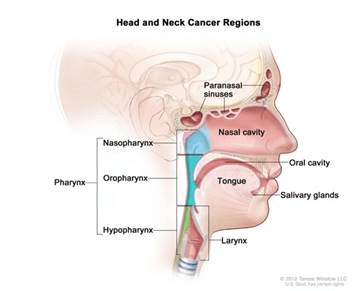April Is Head & Neck Cancer Month
- Category: Cancer Center
- Posted On:

What are Head and Neck Cancers?
Head and neck cancer is a general term used to describe a number of different malignant tumors that develop in or around the lips, mouth, salivary glands, throat, larynx, nose, and sinuses.
 What Causes Head and Neck Cancers?
What Causes Head and Neck Cancers?
Two of the most important risk factors for head and neck cancers are alcohol and tobacco use (including smokeless tobacco such as chewing tobacco or snuff). 75% of new head and neck cancer diagnoses are linked to these factors.
Another risk factor that has risen significantly in recent years is infection with cancer-causing types of human papillomavirus (HPV). HPV-16 in particular is a risk factor for cancers that form in the oropharynx and involve the tonsils or the base of the tongue. About 70% of oropharyngeal cancers are caused by HPV.
What is Human Papillomavirus (HPV)?
HPV is a virus that can infect the skin or mucus membranes through skin-to-skin sexual contact. Most infections occur without any symptoms and the body fights off the virus; however some infections persist for many years and cause abnormal cell changes that can progress to cancer. It is not known why the body is able to fight some HPV infections, and not others.
Can HPV Be Prevented?
Some studies suggest that HPV infections that cause head and neck cancer may be spread through oral sex, and possibly by “open mouth” kissing, however we do not know for sure. Avoiding oral HPV infection may reduce the risk of HPV-associated head and neck cancers.
The FDA- approved HPV vaccines that are currently available were developed to prevent cervical and other less common genital cancers. It is possible that the HPV vaccine might also prevent oropharyngeal cancers, since the vaccine prevents an initial infection with HPV types that can cause oropharyngeal cancers. However, no studies have been done yet to determine if the HPV vaccine will prevent oropharyngeal cancers. More information about these vaccines can be found in the NCI fact sheet Human Papillomavirus (HPV) Vaccines.
How Are HPV Positive Head and Neck Cancers Treated?
Head and neck cancers are currently treated in the same way whether or not they are caused by or related to HPV. Patients with HPV positive head and neck cancer usually have better outcomes than patients with head and neck cancer that is not related to HPV.
Treatment for head and neck cancer can include surgery, radiation therapy, chemotherapy, targeted therapy, or a combination of treatments. The treatment plan is individualized for each patient depending on a number of factors such as the size and location of the tumor, the stage of the cancer, and the person’s age and general health.
Where Do I Go For Questions or Treatment for Head and Neck Cancers?
Mary Washington Healthcare’s Regional Cancer Center has experts available to treat all types of head and neck cancers. The Cancer Center has a specialized Head and Neck Cancer Team that coordinates your care so that you have access to all specialty physicians, a dietician, a cancer nurse navigator, a swallow therapist, and many other resources to ensure you receive the best treatment options as well as an array of support services to help you heal.
Please contact the Regional Cancer Center at 540.741.1236 for more information.
Sources:
- National Cancer Institute
- Centers for Disease Control



